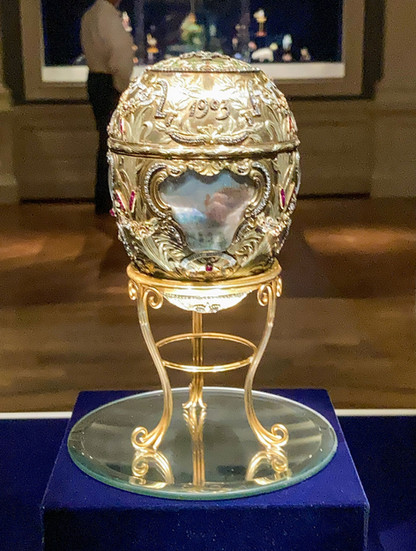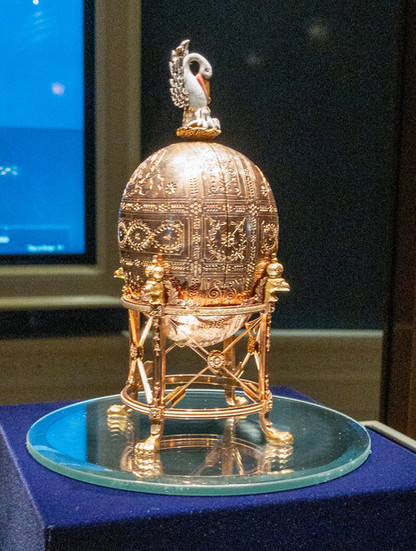Imperial Easter Eggs
- Brenna Reistad
- Apr 23, 2024
- 2 min read
Updated: Apr 29, 2024
Imperial Tsarevich Easter Egg
FABERGÉ FIRM
1912
Russian
Workmaster HENRIK WIGSTRÖM
Gold, silver, platinum, lapis lazuli, diamonds, rock crystal, watercolor on ivory
47.20.34
The Imperial Tsarevich Easter Egg was presented by Tsar Nicholas II to his wife, Empress Alexandra Feodorovna, in 1912. The egg is cleverly constructed to appear as if it is carved from a single piece of lapis lazuli. It actually has six lapis lazuli sections. The joints are concealed under the elaborate gold decorations that include double-headed eagles, a symbol of imperial Russia. The top of the egg is set with a table diamond (a thin, flat diamond) that covers the Cyrillic monogram AF (for Alexandra Feodorovna) and the date 1912.
Imperial Tsarevich Easter Egg Miniature

FABERGÉ FIRM
Russian, 1912
Workmaster HENRIK WIGSTRÖM
Platinum, lapis lazuli, diamonds, watercolor on ivory, rock crystal
47.20.34
Imperial Peter the Great Easter Egg
FABERGÉ FIRM
Russian, 1912
Workmaster HENRIK WIGSTRÖM
Platinum, lapis lazuli, diamonds, watercolor on ivory, rock crystal
47.20.34
The Imperial Peter the Great Easter Egg was presented by Tsar Nicholas II to his wife, Empress Alexandra Feodorovna, in 1903. It commemorates the 200th anniversary of the founding of St. Petersburg by Tsar Peter the Great. The top of the egg bears the Cyrillic initials of Nicholas II and Alexandra Feodorovna. When it is opened, a miniature replica of Etienne-Maurice Falconet’s famous statue of Tsar Peter the Great rises out of the egg.
Imperial Red Cross Easter Egg
FABERGÉ FIRM
1915
Russian
Workmaster HENRIK WIGSTRÖM
Gold, silver-gilt, enamel, mother-of-pearl, velvet, glass, watercolor on ivory
Miniatures by Vassilii Zuiev
47-20.36
The Imperial Red Cross Easter Egg was presented by Tsar Nicholas II to his mother, Dowager Empress Maria Feodorovna, in 1915 as a tribute to her service as head of the Russian Red Cross. This egg is decorated with five bands of white guilloché enamel, each with a different pattern. The central band has a gilded Old Slavonic inscription: Greater love hath no man than this, that a man lay down his life for his friends (Jn 15:13, AV).
Imperial Rock Crystal Easter Egg with Revolving Miniatures
FABERGÉ FIRM
1896
Russian
Workmaster MIKHAIL PERKHIN
Gold, enamel, diamonds, emerald, rock crystal, watercolor on ivory
Miniature paintings by Johannes Zehngraf
47.20.32
The Imperial Rock Crystal Easter Egg with Revolving Miniatures was presented by Tsar Nicholas II to his wife, Empress Alexandra Feodorovna, in 1896 for their second Easter as a married couple—just months before their coronation. The base of this egg is decorated in champlevé enamels and set with rose-cut diamonds. Its upper register features the monogram of Princess Alix of Hesse and by Rhine, Alexandra Feodorovna’s name and title before she married Nicholas in 1894.
Imperial Pelican Easter Egg
FABERGÉ FIRM
1898
Russian
Workmaster Mikhail Perkhin
Gold, diamonds, enamel, pearls, glass, watercolor on ivory
Miniature paintings by Johannes Zehngraf
47.20035

















































Comments